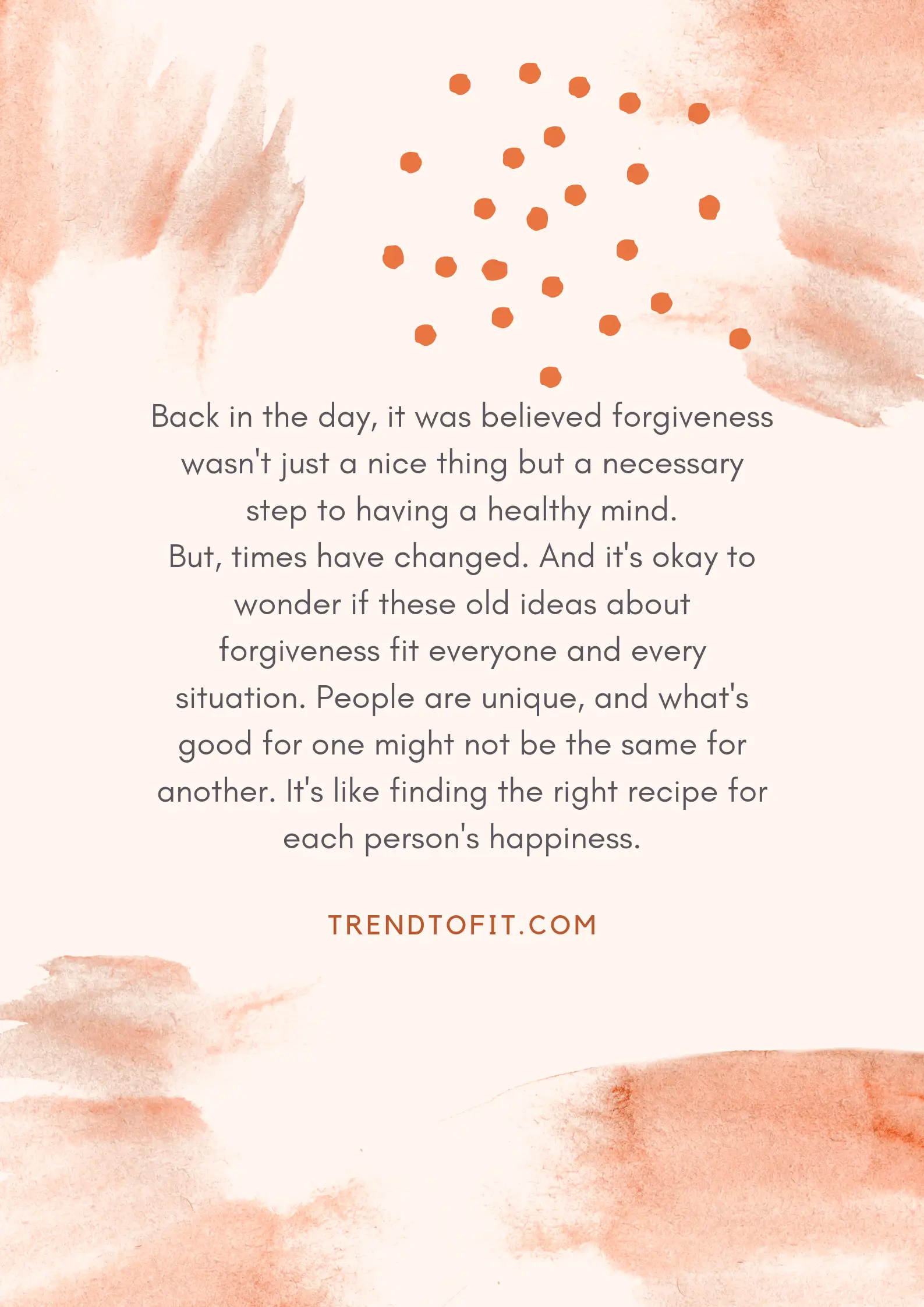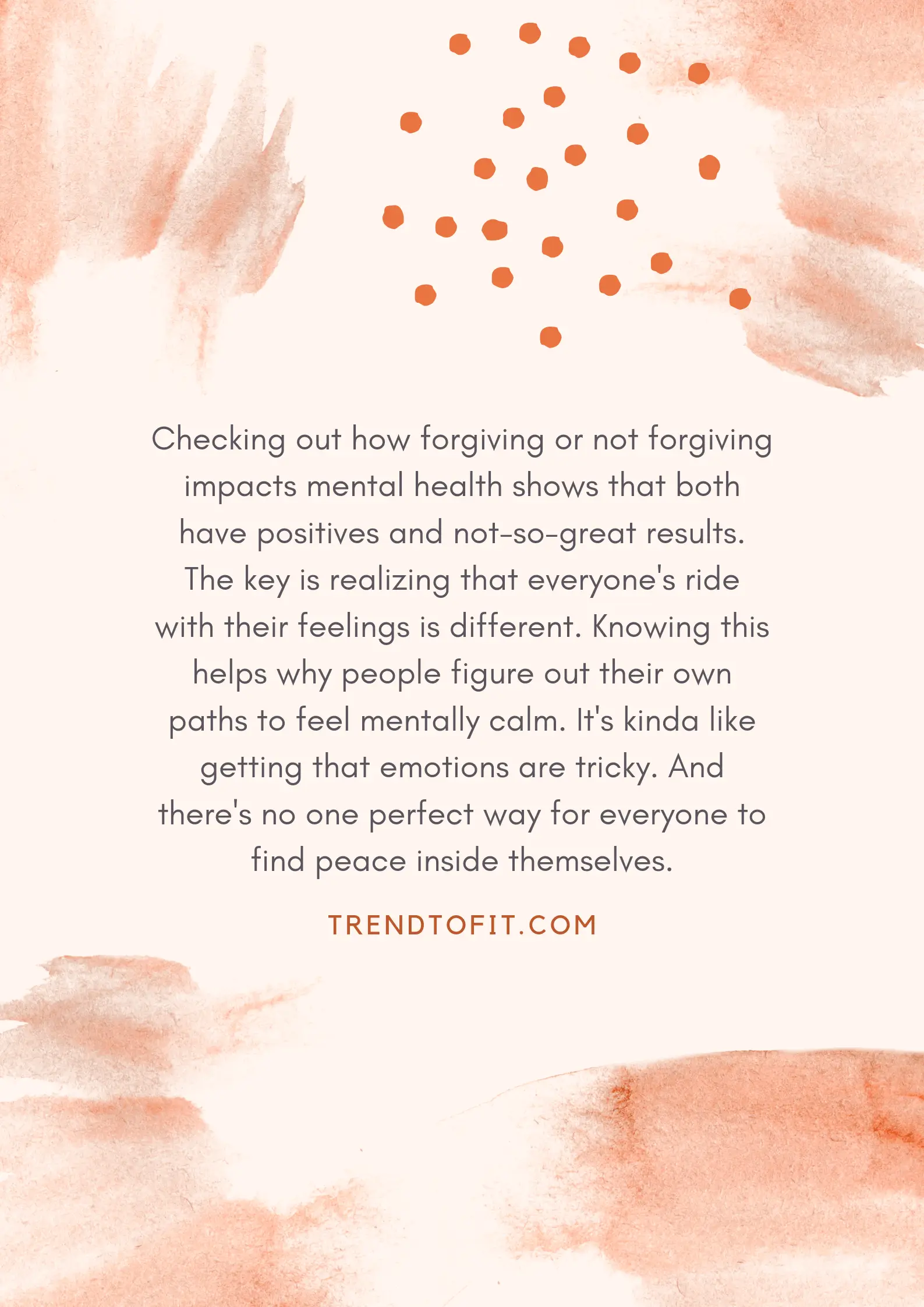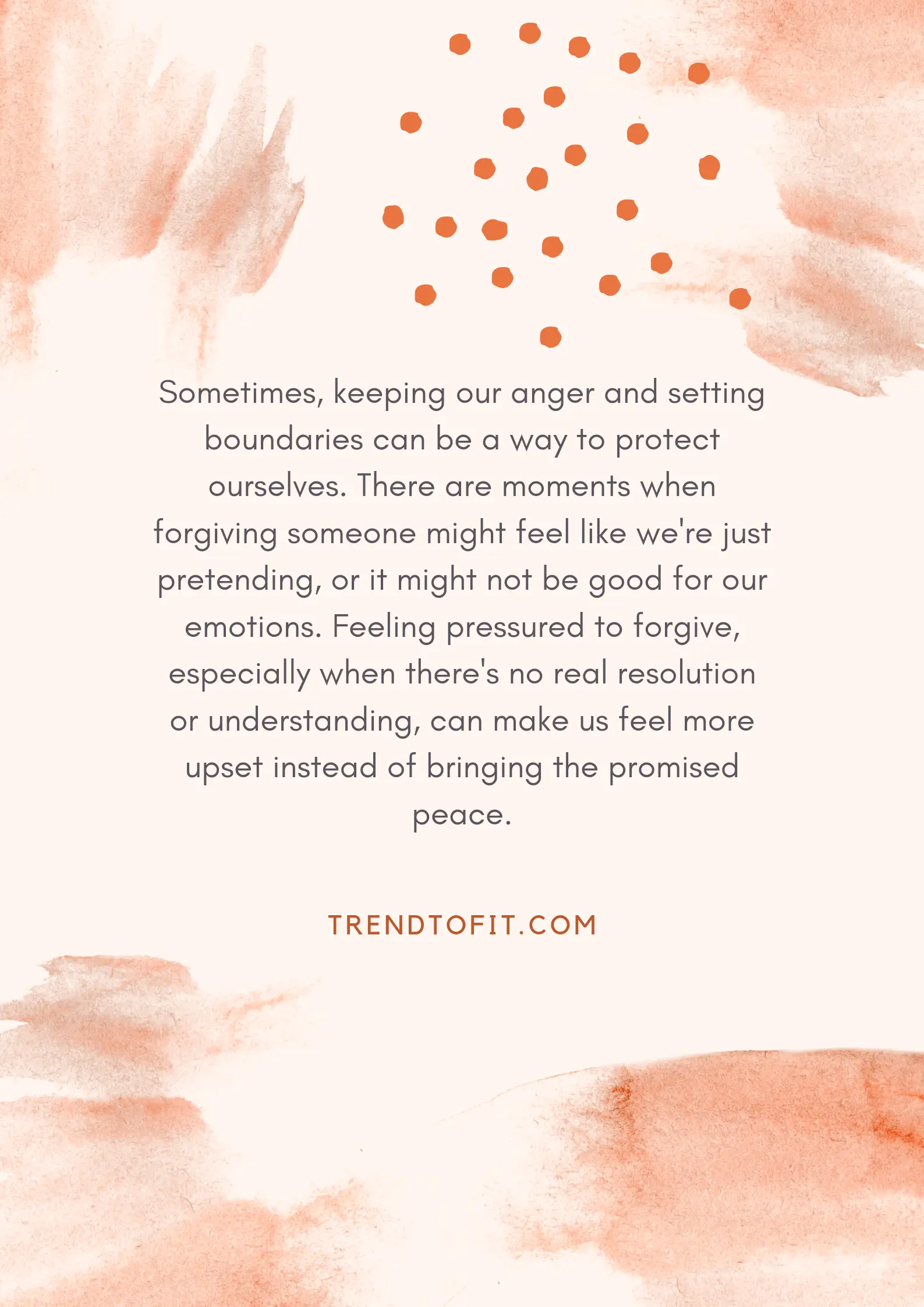When someone hurts you, it’s very natural to develop bitter feelings, hold on to anger, and live in resentment. But living like this is not healthy either. So, you need to move on. Is it that easy? No. And here comes forgiveness.
People say: forgive and you will get peace. But how? If I can’t tolerate what they did to me, how can I forgive them? And how will I get peace?
Do these questions bother you? The article is for you!
Understanding Forgiveness
Forgiveness has been considered one of the highest virtues since forever. From Eastern to Western philosophies, a forgiver gets respect & appreciation. The logic is: it’s not easy to let go but holding grudges only makes you mentally weak. Forgiving those who hurt you isn’t just nice but also makes you feel good. It’s necessary for a healthy mind.
Forgiveness frees you from the prison you create due to heavy feelings from things that happened before. It’s said that when you see the situation from another’s perspective, you will find everyone guilty in some way. This thought stops you from being mad and trying to understand others.
Undoubtedly, it’s a very beautiful logic and it indeed makes a big change inside. One who practices forgiveness gets inner peace. They start feeling better emotionally and make room for good feelings.
Many times forgiveness restores old relationships and makes them even better. And even science says it is not just a good thing. It’s an important and practical step to have a healthy mind (1), (2), (3).
But the thing to consider is if forgiving is always right. If forgiveness is so peaceful, why do we fail at it? And the most important question is: why is a person judged if they don’t want to forgive?
Let’s explore the other side:
Other Side Of The Coin
There’s a different view with a lot of questions:
- Is forgiveness the right answer for everyone when it comes to feeling mentally peaceful?
- Does it not depend on the nature of the offence?
- Why is the person who suffered forced or expected to forgive? Isn’t his/her right to decide if or when to forgive?
- Does pain go away after forgiving? If not, why to forgive?
- Will the person who offended not be encouraged to do wrong if forgiven easily?
- Is forgiveness possible when the person does not feel guilty or asks for an apology?
- Sometimes, the one who got hurt faces challenges and the one who has hurt mocks or enjoys it. So, in that case, how to forgive and most importantly why to forgive?
- How long should you forgive? And in which situations you should not forgive?
What’s More Important, Forgiveness Or Mental Peace?
Sometimes, holding onto anger and setting boundaries seem to be the only way to protect yourself. In situations where there’s a lot of hurt or when someone keeps doing wrong things, forcing forgiveness without dealing with the real issues isn’t helpful at all. It worsens the situation by delaying forgiveness rather than bringing the promised peace. It feels like you’re just pretending.
Another point to consider is that forgiveness doesn’t automatically make the pain go away or fix what happened. Peace comes when you admit the hurt, set limits, and look for other ways of healing than forgiving.
It also shows how emotions are complicated. Every person is different so everyone’s journey to feeling calm inside is different. And that’s why what’s good for one person might not be the same for another.
So, neither a person should be judged or not forced to forgive. The priority should be finding leave first. The person should have a choice of when or when not to forgive.
Impact On Mental Health
Forgiving
While forgiveness frees you from getting stuck in the past, it has a good effect on mental health. But as I mentioned above, not always.
For some, it heals quickly but for others, it might take time and thinking. How much forgiveness helps depends on things like what happened, if the apology was sincere, and if the person can forgive easily.
Not Forgiving
Similarly, choosing not to forgive can also affect the mind. Holding onto anger keeps you feeling bad for a long time and gives you a lot of stress. But not forgiving doesn’t mean you have to stay in a bad mood.
They can protect their minds by setting limits and taking care of themselves. You should know to differentiate when holding onto anger is helping you stay safe and when letting bad feelings linger without fixing them isn’t.
Things To Remember: The Answers To Your Questions
In my opinion, certain things should be remembered:
- Forgiveness should not be forced.
- If one person fails at it, he shouldn’t be judged.
- Some actions can’t be forgiven. Even God doesn’t forgive.
- The one who got hurt should also understand that you can protect yourself by not forgiving for now, but you have to forgive one day.
- One should tolerate it to an extent. If it is the question of protecting a woman or Guru’s honour, or the question of saving someone helpless, your silence becomes your crime. It’s said in Hinduism. You must punish or get them punished.
- Forgiveness doesn’t mean forgetting their actions. Even if you are punishing them, your intention should be punishing their actions, and not them.
- As Bhagwan Krishna says to Arjun in Bhagavad Gita if you fight the war for the sake of establishing dharma or punishing them for the sake of society, it’s Dharma (right). But if you fight for your revenge, it won’t bring you peace. So forgive them at your heart, but punish them so they don’t commit further sins.
- Mahatma Gandhi also said: Hate the sin but not the sinner. Hate the evil but not the evil-doer.
- If you follow these principles, you will be able to forgive them easily and get peace for sure.
Discovering Other Ways To Inner Peace
- Don’t rush the healing. It is an ongoing process and comes automatically. Try these healthy mental habits in between.
- Accept what the situation is. Accept yourself. Acceptance helps.
- If you’re struggling with negative thoughts, here is how you can put a pause button on them.
- Let go of that relationship. It’s not easy. I am not asking to forgive, but just let it be.
- If you can try yoga or meditation, do it.
- Engage in stress-buster activities that bring you joy.
- Get productive. Try something new. It will be fun too.
- And try to uncomplicate your life.
- In the end, you will be able to practice gratitude.
Related:
- Losing your peace of mind? It will help you.
- Self-care practices you should try.
- 40 Positive things to say to yourself.
- Set your life mantras & take the challenge.
Myths
Myth 1: Forgiveness Equals Forgetfulness
Truth: Contrary to what many think, forgiving doesn’t mean forgetting the hurt. It means you are recognising your pain which chokes you inside. You’re still trying to heal and not letting anger take over.
Forgiveness is about moving forward with the memory as a way to grow, not erasing it.
Myth 2: Forgiveness Means Reconciliation
Fact: Forgiving and rebuilding a relationship is different. You can decide to forgive on your own even without their apologies. But reconciling means you have to rebuild trust and reconnect.
Forgiveness doesn’t always mean reconnecting, especially if it could harm you again.
Myth 3: Forgiving Means Condoning the Behavior
Fact: Forgiving doesn’t mean saying harmful behaviour is okay. It’s choosing to let go of negative feelings for yourself. Recognizing the wrongdoing is important, and forgiveness doesn’t excuse the actions.
It never means to support what happened. Forgiveness is to break your prison and free yourself. It’s indeed for you.
Myth 4: Forgiveness Should Happen Quickly
Fact: Forgiving is personal and takes time. Thinking it should happen fast might not let the emotional healing go deep enough.
It’s okay for forgiveness to take time, letting you handle your feelings at your speed.
Myth 5: Not Forgiving Leads to Bitterness
Fact: Deciding not to forgive doesn’t mean you’ll become bitter. I don’t forgive easily. And can tell you it’s my way to protect myself. Whenever I thought about forgiving early, I got more upset. It is much more necessary to search for inner peace and set healthy boundaries first.
Keeping justified anger while taking care of yourself is a valid choice that doesn’t have to end in long-lasting bitterness.
Myth 6: Forgiveness is a Sign of Weakness
Fact: Forgiveness isn’t a weak choice; it’s a brave one. It takes strength to face and understand emotions, let go of resentment, and move forward.
If you can choose forgiveness, you are brave and beautiful. It never makes you a coward.
Myth 7: Forgiving Means Suppressing Anger
Fact: Forgiving doesn’t mean hiding anger. You can forgive while shouting, crying, and showing your anger. If you keep suppressing your anger, you feel more toxic and fail to forgive.
Expressing and dealing with anger healthily is an obvious part of the forgiveness journey.
Myth 8: You Must Seek Apology for Forgiveness
Fact: While an apology can help, it’s not always needed. You can find peace by choosing to forgive on your own, even without an apology.
In most cases, they never feel guilty, let alone asking for an apology. So, let them enjoy their Karma. You just take control of your emotions and forgive.
Myth 9: Forgiving Happens Only Once
Fact: No, not at all! Once you hurt, it is for always. Even if you move on, the scars remain. If you think forgiving is a one-time thing, you’re wrong. You have to forgive them all the time. It can happen many times.
Feelings might come back, and you might need to forgive again. But, every time it gets better. And a day comes when you no longer feel hurt.
Myth 10: Forgiving Makes Problems Disappear
Fact: Nope! Forgiving doesn’t make problems go away. It doesn’t undo what happened. You do it because you are brave. And later, it brings you a lot of peace.
Final Words
In the end, I would say that:
- Don’t feel pressured. Forgiveness comes naturally after you heal. And you will heal for sure. Don’t let anyone decide when and when not to forgive.
- Focus on your healing first. Do whatever makes you happy. Give yourself a break. If possible, plan to travel somewhere to change the atmosphere.
- And remember, your anger is natural, let it release. But don’t dwell on it. Find ways, come out of your room, the new chapter is waiting for you!



Leave a Reply